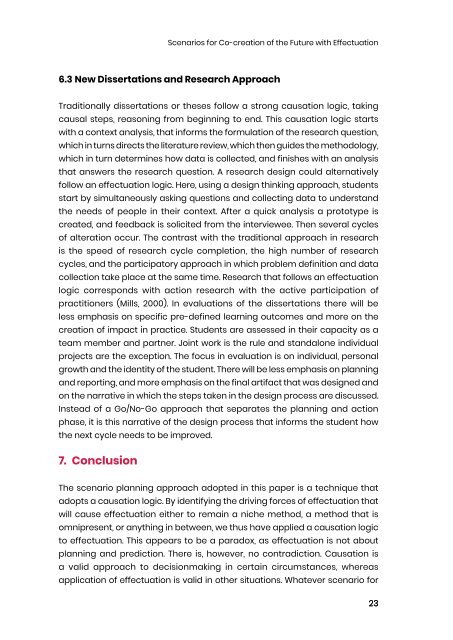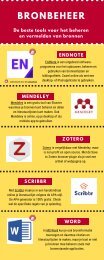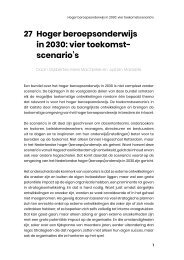19. Scenarios for Co-creation of the Future with Effectuation
Create successful ePaper yourself
Turn your PDF publications into a flip-book with our unique Google optimized e-Paper software.
<strong>Scenarios</strong> <strong>for</strong> <strong>Co</strong>-<strong>creation</strong> <strong>of</strong> <strong>the</strong> <strong>Future</strong> <strong>with</strong> <strong>Effectuation</strong><br />
6.3 New Dissertations and Research Approach<br />
Traditionally dissertations or <strong>the</strong>ses follow a strong causation logic, taking<br />
causal steps, reasoning from beginning to end. This causation logic starts<br />
<strong>with</strong> a context analysis, that in<strong>for</strong>ms <strong>the</strong> <strong>for</strong>mulation <strong>of</strong> <strong>the</strong> research question,<br />
which in turns directs <strong>the</strong> literature review, which <strong>the</strong>n guides <strong>the</strong> methodology,<br />
which in turn determines how data is collected, and finishes <strong>with</strong> an analysis<br />
that answers <strong>the</strong> research question. A research design could alternatively<br />
follow an effectuation logic. Here, using a design thinking approach, students<br />
start by simultaneously asking questions and collecting data to understand<br />
<strong>the</strong> needs <strong>of</strong> people in <strong>the</strong>ir context. After a quick analysis a prototype is<br />
created, and feedback is solicited from <strong>the</strong> interviewee. Then several cycles<br />
<strong>of</strong> alteration occur. The contrast <strong>with</strong> <strong>the</strong> traditional approach in research<br />
is <strong>the</strong> speed <strong>of</strong> research cycle completion, <strong>the</strong> high number <strong>of</strong> research<br />
cycles, and <strong>the</strong> participatory approach in which problem definition and data<br />
collection take place at <strong>the</strong> same time. Research that follows an effectuation<br />
logic corresponds <strong>with</strong> action research <strong>with</strong> <strong>the</strong> active participation <strong>of</strong><br />
practitioners (Mills, 2000). In evaluations <strong>of</strong> <strong>the</strong> dissertations <strong>the</strong>re will be<br />
less emphasis on specific pre-defined learning outcomes and more on <strong>the</strong><br />
<strong>creation</strong> <strong>of</strong> impact in practice. Students are assessed in <strong>the</strong>ir capacity as a<br />
team member and partner. Joint work is <strong>the</strong> rule and standalone individual<br />
projects are <strong>the</strong> exception. The focus in evaluation is on individual, personal<br />
growth and <strong>the</strong> identity <strong>of</strong> <strong>the</strong> student. There will be less emphasis on planning<br />
and reporting, and more emphasis on <strong>the</strong> final artifact that was designed and<br />
on <strong>the</strong> narrative in which <strong>the</strong> steps taken in <strong>the</strong> design process are discussed.<br />
Instead <strong>of</strong> a Go/No-Go approach that separates <strong>the</strong> planning and action<br />
phase, it is this narrative <strong>of</strong> <strong>the</strong> design process that in<strong>for</strong>ms <strong>the</strong> student how<br />
<strong>the</strong> next cycle needs to be improved.<br />
7. <strong>Co</strong>nclusion<br />
The scenario planning approach adopted in this paper is a technique that<br />
adopts a causation logic. By identifying <strong>the</strong> driving <strong>for</strong>ces <strong>of</strong> effectuation that<br />
will cause effectuation ei<strong>the</strong>r to remain a niche method, a method that is<br />
omnipresent, or anything in between, we thus have applied a causation logic<br />
to effectuation. This appears to be a paradox, as effectuation is not about<br />
planning and prediction. There is, however, no contradiction. Causation is<br />
a valid approach to decisionmaking in certain circumstances, whereas<br />
application <strong>of</strong> effectuation is valid in o<strong>the</strong>r situations. Whatever scenario <strong>for</strong><br />
23


















